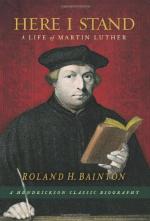
|
| Name: _________________________ | Period: ___________________ |
This test consists of 15 multiple choice questions and 5 short answer questions.
Multiple Choice Questions
1. What does Luther say is comforting and releases one for responsibility for his actions?
(a) to believe that salvation comes from outside ourselves
(b) to believe there is no hell
(c) to believe in pre-destination
(d) to believe there is plenty of time to repent
2. Although preaching on the same topics, how does Luther keep his preaching fresh?
(a) by varying the length of his sermons
(b) by using lots of illustrations
(c) by inviting questions from the parishoners
(d) by highlighting different aspects of the subject
3. What is Luther's firm belief?
(a) that one man can be baptized in proxy for another
(b) that there is benefit in praying for the dead
(c) that the Roman Church will accept his radical ideas
(d) that no man can believe for, or answer for, another man
4. With what does Luther substitute for the chants sung by priests?
(a) arias sung by female voices
(b) organ music by classical composers
(c) hymns sung by the congregation
(d) religious cantatas
5. What does Luther think when Carlstadt attacks images and church music?
(a) that Carlstadt is envious of Luther's prominence
(b) that Cralstadt is being legalistic
(c) that Carlstadt is right
(d) that Carlstadt is wrong
6. Why does the Reformation in Saxony cause confusion?
(a) because there are many different denominations
(b) because each town has its own way of conducting church
(c) because Catholics are being persecuted
(d) because no one known who owns the church property
7. What does Luther undertake to do in his lifetime?
(a) He works to convert all people to Lutheranism.
(b) Luther translates the Bible, catechism, and liturgy as well as a hymn book.
(c) He set out to debate all who disagree with his doctrine.
(d) He establishes Lutheran schools across Germany.
8. How long does it take Luther to translate the New Testament into German?
(a) two years
(b) the rest of his life
(c) six years
(d) three months time
9. What does Bainton suggest about the last quarter of Luther's life?
(a) He mellows and becomes tolerant of the papists.
(b) He turns his attention to more temporal matters.
(c) He ceases to write books and hymns.
(d) He has no crucial achievements.
10. What does Luther say about the life of a Christian?
(a) that the Christian lives in constant fear
(b) that the Christian is free to do whatever he pleases
(c) that the Christian lives not for himself, but for God and others
(d) that the Christian has the greatest chance of offending God
11. Discussion is allowed in Wittenberg, but what is not allowed?
(a) Nothing discussed can be written down and published.
(b) No meetings can have more than fifteen people present at a time.
(c) Luther cannot speak publically in an advertised meeting.
(d) There cannot be any changes in the mass until a unanimous verdict is reached.
12. What is Luther's agrarian thought?
(a) that children should not play
(b) that everyone should farm
(c) that slavery is acceptable
(d) that man should work
13. What does Luther continue to stress in his teaching?
(a) that faith must be accompanied by good works
(b) that doing good deeds will result in salvation
(c) that good works people do need no faith in them
(d) that good works do not constitute any claim on God
14. Who believes that people can come together to defend the right of each person to believe what he wants?
(a) Philip of Hesse
(b) Emperor Charles
(c) Martin Luther
(d) The Augsburg Confession
15. In what areas does Luther excel?
(a) in politics and bringing differing sides to the bargaining table
(b) preaching sermons, translating the Bible, lecturing in class hall, and praying in the upper room
(c) in public education and training new scribe in translation
(d) marriage counselling and preaching on Sundays
Short Answer Questions
1. What is Luther's position as he returns to Wittenberg?
2. What distressed Luther back in Wittenberg?
3. What do the peasants and the princes think of Luther after the Peasant War?
4. What is a result of the expansion of the Reformation?
5. How can Luther be described above all other outstanding attributes he possesses?
|
This section contains 752 words (approx. 3 pages at 300 words per page) |

|




